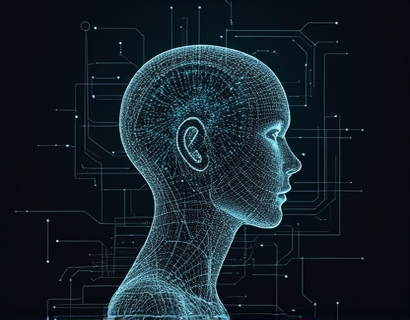AI and Blockchain: Revolutionizing Business Analytics with Secure and Transparent User Tracking Solutions
In the rapidly evolving landscape of technology, businesses are constantly seeking innovative solutions to enhance their analytics capabilities. The integration of Artificial Intelligence (AI) and blockchain technology is emerging as a game-changer in the realm of business analytics. This powerful combination not only provides deep insights into user behavior but also ensures a secure and transparent framework for data management. As organizations strive to improve engagement and drive strategic decisions, understanding the synergy between AI and blockchain becomes essential.
The Need for Advanced Analytics
In today's data-driven world, businesses generate vast amounts of information daily. However, merely collecting data is not enough; organizations must analyze this data effectively to derive actionable insights. Traditional analytics methods often fall short in providing real-time insights and understanding user behavior comprehensively. This is where advanced analytics powered by AI and blockchain comes into play.
Understanding AI in Business Analytics
Artificial Intelligence refers to the simulation of human intelligence in machines programmed to think and learn. In the context of business analytics, AI can process large datasets quickly, identify patterns, and make predictions based on historical data. Machine learning, a subset of AI, enables systems to learn from data and improve over time without explicit programming.
AI enhances business analytics by providing tools for predictive analytics, natural language processing, and data visualization. Predictive analytics allows businesses to forecast future trends based on historical data, while natural language processing enables the analysis of unstructured data, such as customer feedback and social media interactions. Data visualization tools powered by AI help present complex data in an easily digestible format, facilitating better decision-making.
The Role of Blockchain in Data Security and Transparency
Blockchain technology, originally developed for cryptocurrencies, is a decentralized ledger that records transactions across multiple computers. This technology ensures that the data is immutable, transparent, and secure. In the context of business analytics, blockchain can address several critical issues related to data integrity and security.
One of the primary advantages of blockchain is its ability to provide a secure environment for data storage and sharing. Each transaction or data entry is recorded in a block and linked to the previous block, creating a chain of information that is tamper-proof. This ensures that businesses can trust the data they are analyzing, as any unauthorized changes would be immediately evident.
Combining AI and Blockchain for Enhanced User Tracking
The fusion of AI and blockchain technology offers a revolutionary approach to user tracking and analytics. By leveraging AI's capabilities to analyze user behavior and blockchain's security features, businesses can gain deeper insights while ensuring data privacy and integrity.
1. Enhanced User Insights
AI algorithms can analyze user interactions across various platforms, identifying patterns and preferences that inform business strategies. By understanding user behavior, businesses can tailor their offerings to meet customer needs more effectively. For instance, AI can segment users based on their behavior, allowing for personalized marketing campaigns that resonate with specific audiences.
2. Secure Data Management
With blockchain, businesses can securely store user data, ensuring that it remains confidential and protected from unauthorized access. This is particularly important in an era where data breaches are increasingly common. By utilizing blockchain, organizations can provide users with greater control over their data, fostering trust and transparency.
3. Real-Time Analytics
The combination of AI and blockchain enables real-time analytics, allowing businesses to respond swiftly to changing user behaviors and market conditions. AI can process data as it is generated, providing insights that can inform immediate decision-making. This agility is crucial in today’s fast-paced business environment.
4. Improved Compliance
Data privacy regulations, such as GDPR and CCPA, require businesses to handle user data responsibly. Blockchain's transparent nature allows organizations to demonstrate compliance with these regulations easily. By providing a clear audit trail of data access and modifications, businesses can ensure they meet legal requirements while maintaining user trust.
Applications of AI and Blockchain in Business Analytics
The integration of AI and blockchain technology has numerous applications across various industries. Here are some key areas where this combination is making a significant impact:
1. E-commerce
In the e-commerce sector, businesses can utilize AI and blockchain to track user behavior, preferences, and purchase history. This data can inform personalized marketing strategies, improve customer experience, and optimize inventory management. Blockchain can also enhance payment security and reduce fraud, providing a safer shopping environment for consumers.
2. Healthcare
In healthcare, patient data security is paramount. By leveraging blockchain, healthcare providers can securely store and share patient information, ensuring that it remains confidential. AI can analyze patient data to identify trends, predict health outcomes, and personalize treatment plans, ultimately improving patient care.
3. Finance
The financial industry is increasingly adopting AI and blockchain to enhance fraud detection and risk management. AI algorithms can analyze transaction patterns to identify anomalies, while blockchain provides a secure and transparent record of transactions. This combination helps financial institutions mitigate risks and improve operational efficiency.
4. Marketing
Marketing teams can benefit from AI and blockchain by gaining deeper insights into customer behavior and preferences. AI can analyze data from various sources, including social media, to identify trends and inform marketing strategies. Blockchain ensures that data is secure and verifiable, allowing marketers to build trust with their audiences.
Challenges and Considerations
While the integration of AI and blockchain presents numerous benefits, there are also challenges that businesses must consider. These include:
1. Technical Complexity
Implementing AI and blockchain solutions can be technically complex and may require specialized expertise. Businesses must invest in training and development to ensure their teams can effectively leverage these technologies.
2. Data Privacy Concerns
Despite the security features of blockchain, data privacy remains a concern. Organizations must ensure that they comply with data protection regulations and implement measures to protect user privacy.
3. Integration with Existing Systems
Integrating AI and blockchain with existing systems can be challenging. Businesses must carefully plan their implementation strategies to ensure a smooth transition and minimize disruptions.
Future Trends in AI and Blockchain Analytics
The future of business analytics will likely see continued advancements in AI and blockchain technology. Some emerging trends include:
1. Increased Adoption of Decentralized Analytics
As businesses seek greater transparency and security, decentralized analytics powered by blockchain will become more prevalent. This approach allows organizations to analyze data without relying on a central authority, enhancing trust and collaboration.
2. Enhanced AI Capabilities
AI technology will continue to evolve, with advancements in natural language processing, computer vision, and machine learning. These enhancements will enable businesses to gain even deeper insights into user behavior and preferences.
3. Greater Focus on Ethical AI
As AI becomes more integrated into business processes, there will be a growing emphasis on ethical AI practices. Organizations will need to ensure that their AI systems are transparent, fair, and accountable, addressing concerns related to bias and discrimination.
Conclusion
The integration of AI and blockchain technology is revolutionizing business analytics, providing organizations with secure and transparent user tracking solutions. By leveraging the strengths of both technologies, businesses can gain deep insights into user behavior, enhance engagement, and drive data-driven decision-making. As the landscape of technology continues to evolve, embracing this powerful combination will be essential for organizations seeking to stay competitive in an increasingly data-driven world.




































